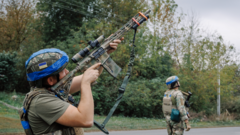Ukrainian forces maintain a foothold in Kursk, having captured this territory nearly a year ago, despite claims by Russia of full recapture. Military actions and troop movements reveal a complex dynamic as both sides engage in high-stakes confrontations.
Ukraine Confirms Continued Presence in Kursk Amidst Heavy Russian Counterattacks

Ukraine Confirms Continued Presence in Kursk Amidst Heavy Russian Counterattacks
Ukraine's military leadership asserts ongoing control over a small section of Russian territory in Kursk, despite intense pressure from Moscow.
Ukraine's military leaders have announced that their forces retain a defensive position within the Kursk region of Russia, an area they initially captured during a surprise incursion in August 2024. This development comes amidst a significant effort by Russia to reclaim the territory, which spans over 1,000 square kilometers.
Oleksandr Syrsky, Ukraine's commander-in-chief, reported that roughly 10,000 Russian troops are actively engaged in attempts to displace Ukrainian forces from the area, yet he insists that Ukrainian soldiers still hold approximately 90 square kilometers of strategic ground. Syrsky emphasized the importance of escalating military operations against Russian targets, stating, "Of course, we will continue. Given that we are not fighting against the population, we are fighting and destroying purely military targets."
The Kursk operation, which began on August 6, 2024, aimed to create a buffer zone for Ukraine, limiting Russian troop movements in essential regions. However, Ukraine's progress faced setbacks when Moscow deployed reinforcements, including thousands from its ally North Korea.
Recent developments have seen Ukrainian positions under increased pressure, with Russia mobilizing around 70,000 troops alongside extensive drone assaults to reclaim the area. The involvement of North Korean forces has been particularly notable, with about 11,000 troops sent in last year specifically to counter the Ukrainian incursion. Reports indicate high casualties among these troops, with several hundred fatalities surfacing in just the first few months of combat.
In a further commitment to the conflict, North Korea's government recently expressed plans to dispatch additional mine-clearing operatives and infrastructure repair units to aid Russian efforts in the Kursk region.
As this situation evolves, both sides continue to navigate the complexities of a protracted conflict, with military strategies adjusting to the on-ground realities.


















